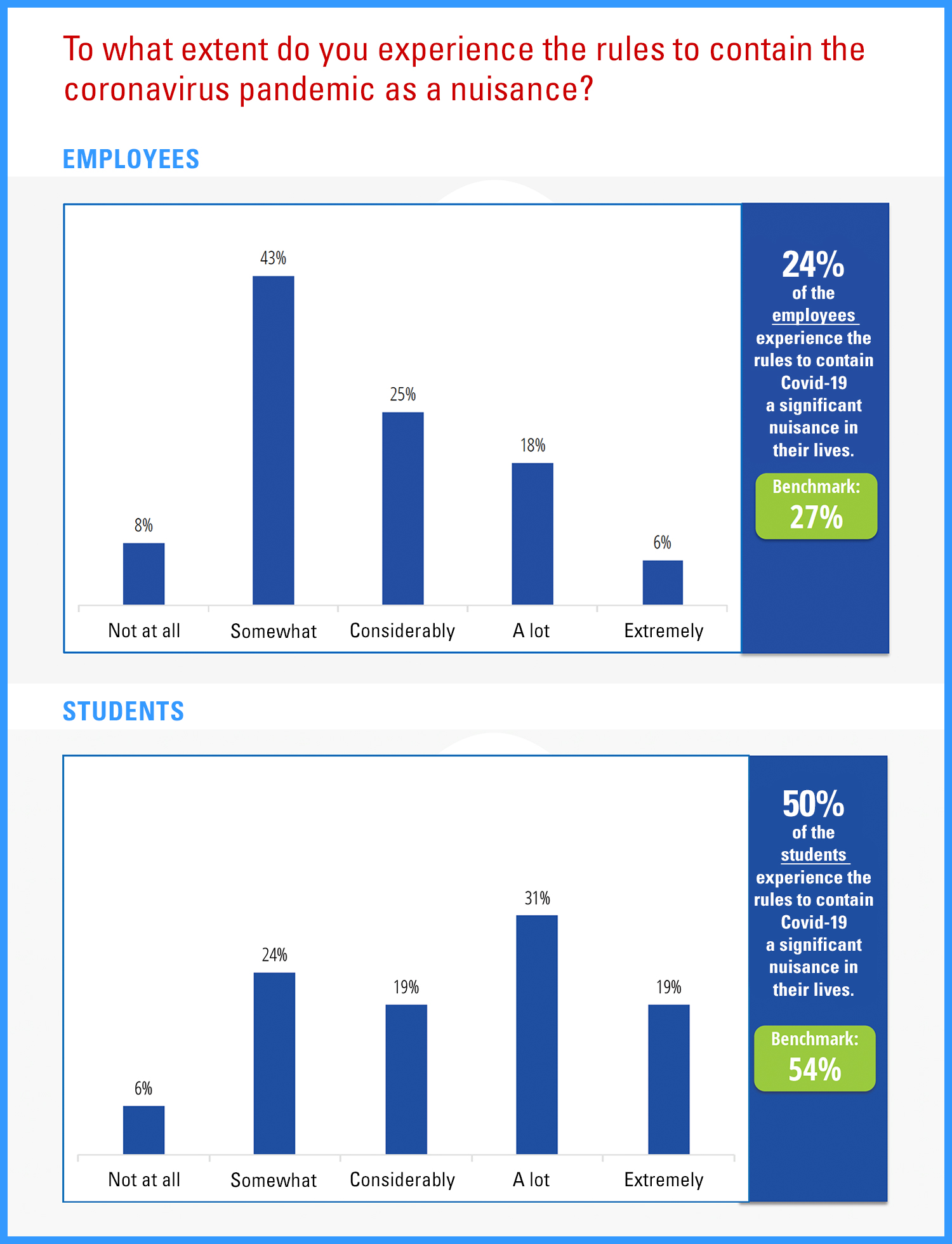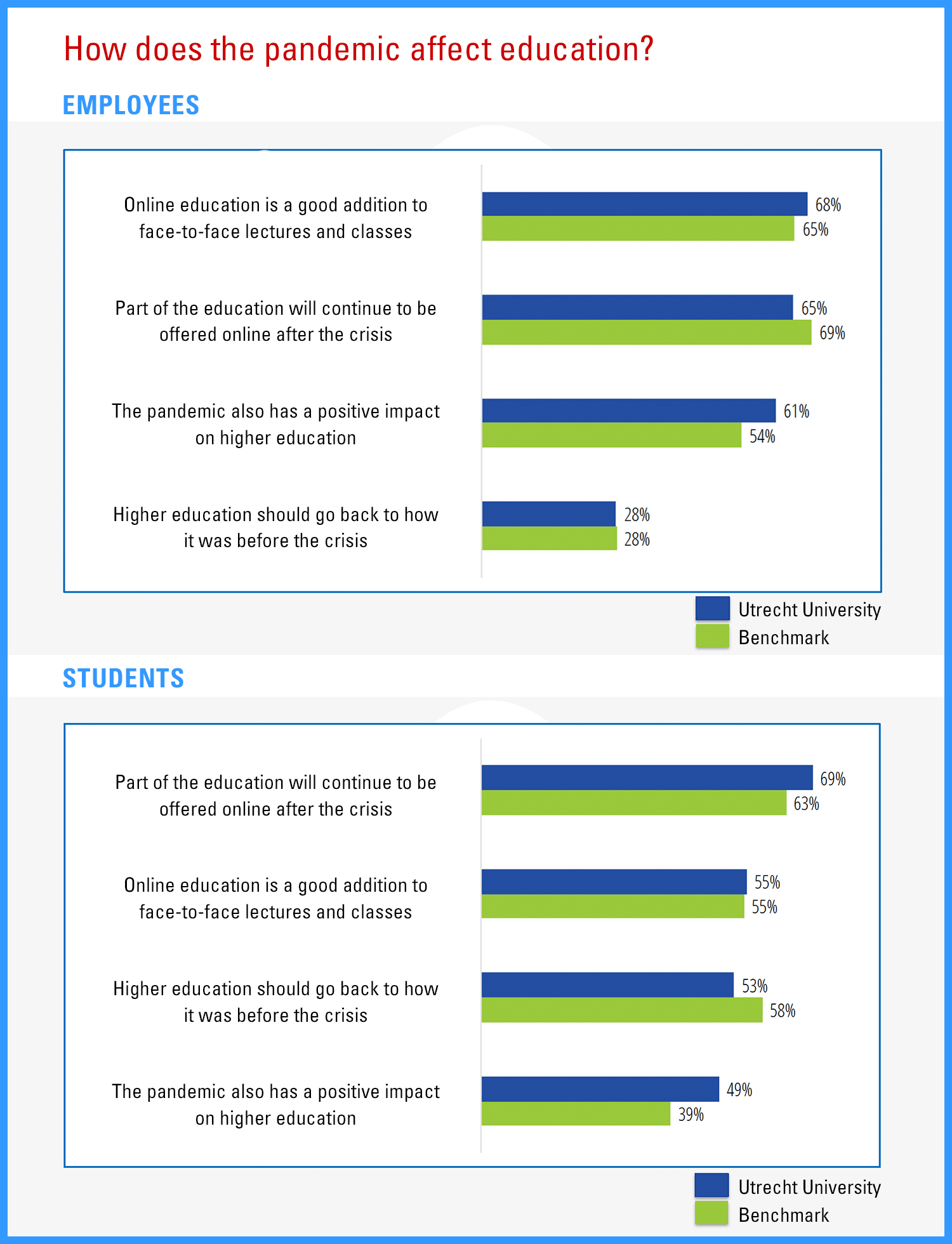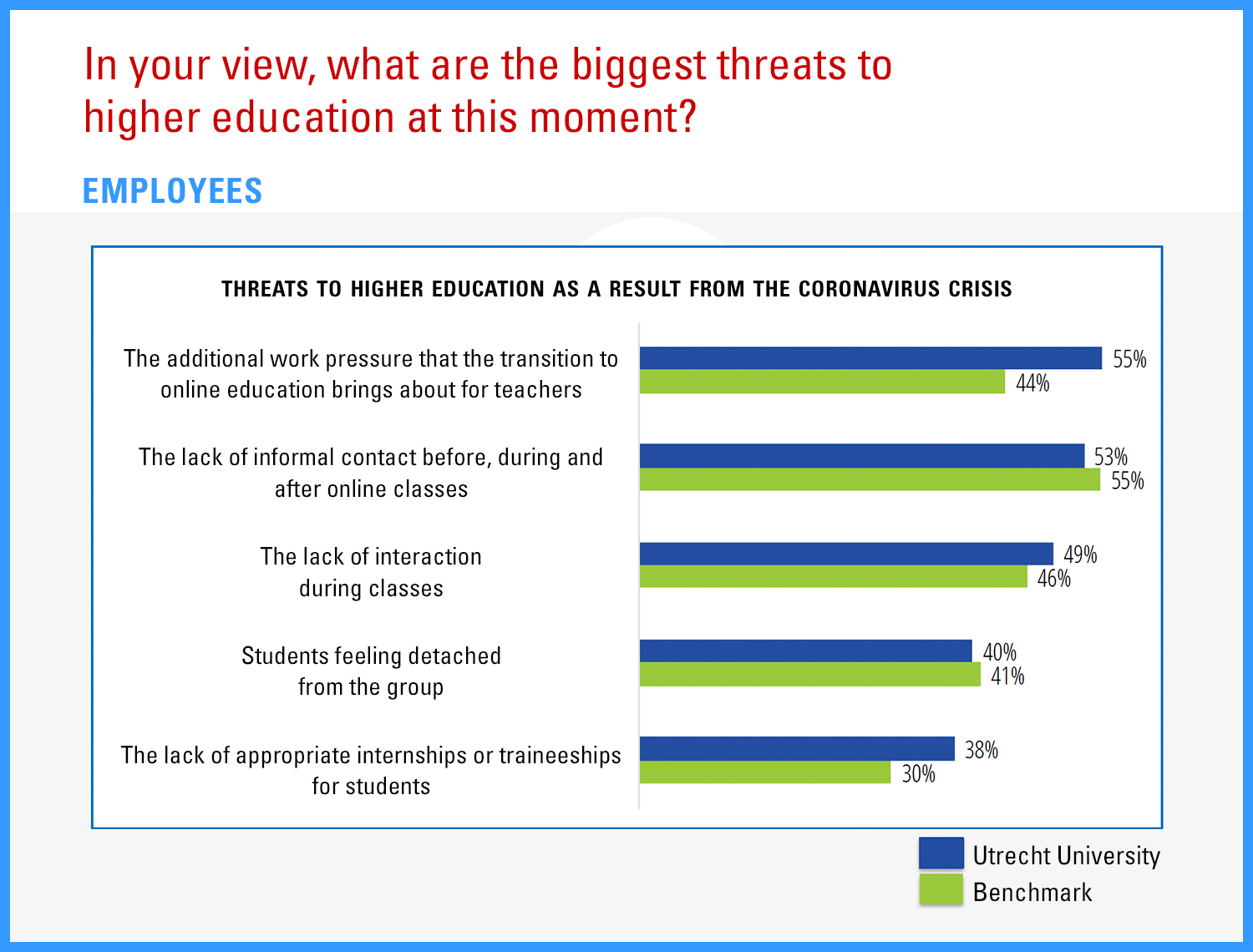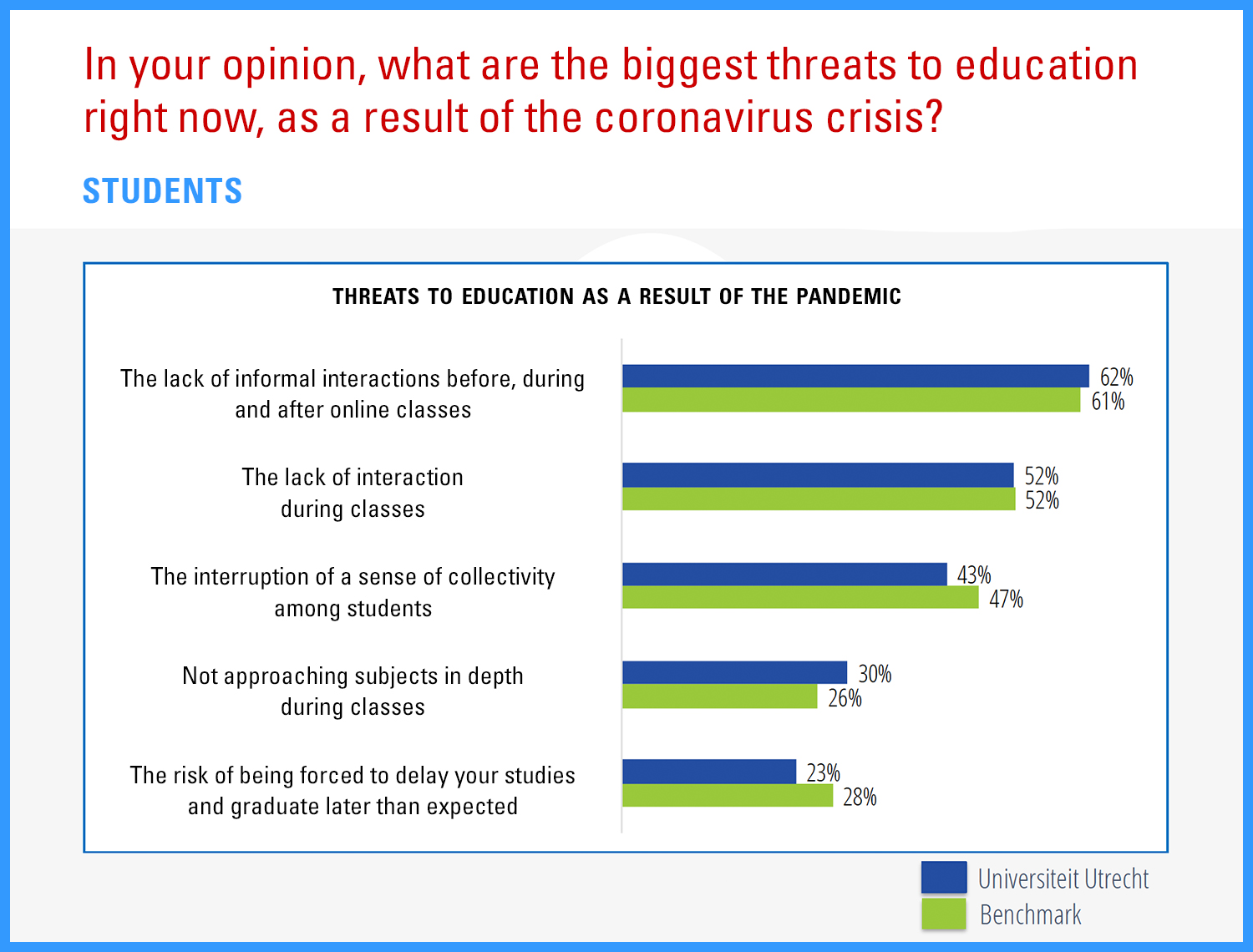DUB survey proves lack of face-to-face contact is detrimental to motivation

“Online education is so distant and demotivating. It demands a lot from students, we have to constantly recharge and carry it on and on. I haven’t been to the university since March 2020. My personal sticking point is that I don’t see anyone: no teachers, no friends or fellow students, I have to do almost everything alone.”
This is one of the hundreds of comments made by students and employees in a survey about their wellbeing and mental health after a year of pandemic, and their expectations for a Covid-free future. Created by research agency Newcom, the survey was conducted at five research universities and two universities of applied sciences in the Netherlands. A total of 190 students and 136 employees from Utrecht University participated in the survey. This article will focus on what they said.
According to the researchers, the results are merely indicative. For a truly accurate picture, a minimum of 380 students and 340 employees should have participated. Nationally, a total of 607 students and 743 employees responded to the survey. The UU data is for the most part comparable to the national data.
I lost my interest in studying because of online learning, even though I do think what I study is fun and interesting
Working from home for a year has its effects. Among the positive aspects of it, the UU respondents mention having more time for their families and for taking up new hobbies. Not having to commute is also appreciated. “The flexibility and absence of unnecessary commuting make it nicer to study. I also like working on assignments at my own pace”.
Still, the sense of loss prevails. Most respondents complain about not seeing teachers and fellow students. Freshmen say they have no idea what student life is supposed to look like, and they lament haven’t been able to get to know any of their peers. “I don’t know any of my classmates, so I feel rather lonely sometimes. I feel as though I have to do everything by myself, because I can’t just chat and discuss things with others”, says one of the respondents. Those enroled for a longer period of time struggle to adapt to an exclusively online format. “It’s become inhumane, literally and figuratively. Online debates suck, I barely have any social life and I haven’t obtained a single ECTS since last year.”
Things aren't any easier for teachers, who miss their students and colleagues. “I don’t get to see my students at all anymore. All I see are talking heads on a screen. I’ve become kind of estranged from colleagues I don’t work closely with, because I can’t have a chat with them in the pantry or the hallways,” one teacher writes. Another one says the biggest issue is that "everything is monotonous and done in the same space, which is taken to the extreme when you live in a studio, like myself. Keeping your work and private life separate can be incredibly difficult, which can easily lead to working overtime, feeling lonely, and getting in a slump. It’s costing me more and more effort to keep the sense of being in a team alive.”

Two of my teachers had a burnout. Disgraceful! The UU is carried by its teachers. They deserve more investments, support, and appreciation
The biggest consequence of working from home all the time is that motivation drops significantly. Most employees complain about the increasing workload and lack of appreciation. One teacher says: “The coronavirus crisis has significantly increased our workloads. There are initiatives to try and reduce them, such as that week with fewer emails, but they are almost insulting: all the tasks I do clearly affect the quality of my education and,4 at the end of the day, that's what I’m assessed on. These initiatives seem to assume that I’m frivolously doing things that aren’t really necessary, which simply isn’t true.”
The lack of recognition and appreciation from the university or faculty is something employees mention several times. “During the first wave, I had to work an extreme amount of overtime to prepare classes, which resulted in good results for the students. The faculty of Social Sciences didn't compensate me at all for these efforts”. Another teacher writes: “As an organisation, UU is overexploiting its staff. Our contracts are worth nothing, our achievements guarantee nothing. Education is uninterested, aimed at student numbers; research is something I should do in my own time; financing research is a lottery; the bureaucracy and management mentality are everywhere; and the best among us choose to cut their losses and leave. We’re playing in stoppage time. It’s a disgrace. Everything had to be business as usual, just continue as is, except online. Not once did they think about what we should really do in a crisis.”
I can barely stay focused during class, I’m too easily distracted, I’m barely motivated during terms with a lot of online classes. I’ve thought about putting my studies on hold for a while, as this just isn’t for me. But if I do that, I’ll lose my group and all my friends will graduate before me
Students aren't motivated, either. They complain about concentration issues, not being inspired enough to pay attention to classes or actively participate in class. “I’ve lost all my interest in studying because of online learning, even though I do think what I study is fun and interesting,” one student writes. Another one: “There are no lectures. Work groups are only half as effective through Microsoft Teams and the university's platforms don't always work. Having to use a webcam to have classes at home is something I experience as an invasion of my private life. Sitting in the same spot the whole day to study and then having to sit there as well if I want to play a game or watch a movie, because I can’t go out, is very exhausting. It doesn’t help my concentration and I don't like having little contact with fellow students and teachers.”
A recent study showed that students are obtaining at least as many ECTS as before the crisis. Still, the data from this survey is a mixed bag. Nearly 40 percent of respondents state they spend more time on their studies. “I study more now. There’s no commuting time and studying from home is more flexible for things like eating and getting a cup of coffee. That helps me staying focused. Furthermore, the methods of testing for my programme have been adjusted. Instead of memorising things, they now expect us to apply the theories. That works a lot better for me.” For numerous students, these changes yields positive results. “It’s well-organised, all credits are obtainable, I haven't experienced any issues.”
But obtaining credits isn't always enough. “I have very little motivation. Online education isn’t educational, but there isn’t anything else to do in my daily life, so I have enough time to work on my studies and get the credits I need. In the end, those credits mean less to us students, because I’ve been learning significantly less.”
There are, of course, also students who got far fewer credits than normal. “I haven’t obtained a single credit since last year. My biggest problem is that I’m missing that sense of studying, although I think this is a result of online classes.”
Most of all, I'm nervous about what my programme will look like after the pandemic. I actually don’t mind how education is being provided now: apart from a few practical sessions, I think everything has been translated to an online environment very well
One of the questions posed by the survey was whether the university should continue to offer online education in the future. Both students and teachers are divided on the issue. Two thirds of the teachers think that online classes could be a good addition to regular classes on campus. “Supervising students can be done very well online, not to mention it can save a lot of commuting time for students. Some of my students live in Zwolle and they have to travel for an hour to get to the university. In terms of education, a hybrid form is the future. The facilities at the lecture halls aren’t ideal yet (UU, please pay more attention to that), but certain classes can easily be given online (explaining theory, discussing examples, practicing exams). Work groups are better at the university. But the structure of the course, which is usually of one lecture and one tutorial every week, I’ll definitely do differently in the future.”

Not all teachers are of the same opinion. “Despite all the questions about the ‘positive effects’ of the coronavirus crisis, this past year has basically shown the value of true contact, and that online education isn’t real education. Adding a handful of knowledge clips to my course? Fine. But I will never do synchronous online classes anymore (and please don't come with 'but students ask a lot more questions via chat'. If your students don’t ask questions in a regular class, that means you’re not teaching your class well)".
Students are equally torn between the two options. A little more than 50 percent of the students see online education as a good addition to education on campus. “If it were possible, I’d do my entire study programme online. I know it isn't possible, but I hope that I’ll at least be able to attend my lectures online. For me, online classes work a lot better and I know I’m not the only one. I hope educational institutions will give students more options after the pandemic, so they can study however they want. That way, students can learn in a way that suits them and their results are guaranteed to be favourable. Only the students who want online classes to end seem to appear in the news, but please listen to the other side as well.”
Make face-to-face options are available for every course, and then students can choose to join either online or offline
The other half wants to return to the old situation as soon as possible. “I’m really scared that online education will stick around. I understand that it is great for some students, but it’s disastrous for others. If UU does choose to offer more online classes after the crisis, I hope they’ll consider the students and teachers who prefer to be physically present on campus from Monday to Friday. After all, that is studying.”
Opinions vary widely about what the future should look like. Some want more online education, others want to return to the way things were. Employees wouldn’t mind working from home more often, while students think they’d stay home with their parents a lot more if they didn’t have to commute to school as much.
It’s clear that the Covid-19 pandemic has left a deep imprint on almost everyone. The students do appreciate the teachers who, despite everything, kept their classes going. “Two of my teachers had a burnout. Disgraceful. The UU is carried by its teachers. They deserve more investments, support, and appreciation.”
But many say this crisis offers us the chance to reflect on improvements for the future. Like one student stated, “there’s a difference between the coronavirus restrictions and the fact that all education is online. I’m feeling gloomy due to the combination of it all, but if everything was normal and only my classes were online, I wouldn’t mind the situation as much.”